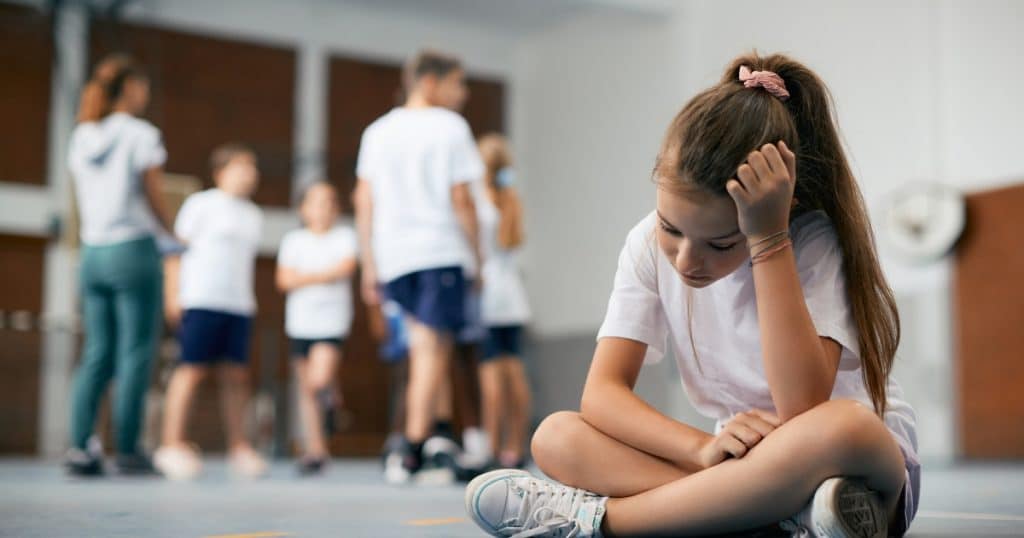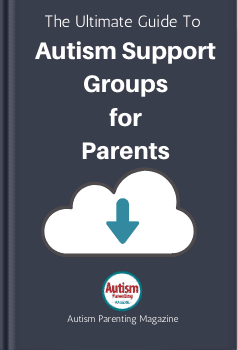For a lot of autistic people, masking is a method used to keep away from feeling misplaced or going through judgment from others. Nevertheless, whereas it could assist in the brief time period, it usually results in important emotional and psychological pressure in the long term.
Over time, the fixed effort to cover or change one’s true self may end up in exhaustion, nervousness, and a way of disconnection from others. It is very important acknowledge the results of masking in order that autistic people can obtain the help they should categorical themselves authentically and really feel accepted of their environments.
Obtain your FREE information on
Autism Assist Teams for Dad and mom
What’s masking in autism?
Masking refers back to the efforts of people on the spectrum to hide behaviors related to autism to keep away from being perceived as autistic. They might attempt to cut back their stimming behaviors or disguise them from others.
In an try and “slot in” with their friends, they could mimic the behaviors of these round them or memorize conversational scripts to make use of in social interactions. The first aim of masking is usually to look non-autistic and adapt to societal expectations.
The short-term results of masking in autism
Whereas some people with autism could have interaction in masking, the trouble to constantly conceal their autistic traits might be extraordinarily exhausting. This fixed suppression of pure behaviors usually results in important bodily and emotional exhaustion.
Such day by day exhaustion can result in extra stress for the autistic youngster, in addition to despair, overwhelming nervousness, or different psychological well being signs.
The short-term results of masking in autism
Concealing or trying to hide their autism could cause a toddler to disclaim their general id. Autism is a lifetime analysis, and concealing it will possibly result in different psychological health-related circumstances.
Autistic youngsters have to embrace their analysis and perceive the way it makes them distinctive. It might probably grow to be unhealthy for a person to direct all their vitality in the direction of trying to disclaim who they’re to others.

Your youngster could masks in response to bullying at college or after listening to unfavorable remarks about their stimming or verbal responses.
Some youngsters will even contain themselves in masking their autism underneath the idea that they really feel that it makes their dad and mom or different relations really feel “unhappy.”
Lengthy-term results of masking autism
All people with autism and people with any type of incapacity will ultimately have to discover ways to “self-advocate.” People concerned in “masking” their autism could miss out on growing the important life talent of self-advocacy.
You possibly can’t advocate for your self in a college system or a spot of employment in case you are unwilling to embrace your incapacity. People masking their autism could grow to be unaware of the mandatory lodging that they require in life to proceed being profitable.
Youngsters who acknowledge their autism-related traits could also be shocked to search out non-autistic people who embrace and settle for them.
Whereas this acceptance might not be common, youngsters can start to see {that a} supportive group of individuals values and appreciates them for his or her particular person qualities.
Many dad and mom are “impressed” with their youngsters’s means to “masks” their autism. They imagine that as a result of “masking” entails the next stage of considering expertise, one way or the other, this implies one thing “constructive” for his or her youngster.
Dad and mom could not understand that youngsters with stage 1 autism who have interaction in “masking” face distinctive dangers. Though these youngsters usually obtain some stage of help for his or her autism, masking their behaviors can forestall them from accessing the care or remedy they genuinely want.
Some autistic youngsters who have interaction in “masking” could keep away from sure settings, fearing they’ll be labeled as “autistic” or “particular schooling.” These settings can embody faculties, hospitals, church buildings, or counseling places of work.
Avoiding them could result in missed alternatives for precious skilled help and steerage.
Coping methods for decreasing autism masking
People participating in “masking” could profit from taking part in a social expertise group. These teams are usually small, with youngsters roughly the identical age.
Social expertise teams for autistic youngsters usually work on growing conversational expertise, sustaining applicable eye contact, and turn-taking behaviors. They usually help youngsters in celebrating their autism and variations.
Such teams may help your youngster who’s participating in “masking” acknowledge that among the behaviors they’re making an attempt to cover are frequent amongst their autistic friends. This understanding can present reassurance and cut back the stress to hide their traits.
Encourage your autistic youngster to attach with different autistic youngsters at college and locally. This interplay may help them develop a wholesome sense of self-identity and perceive that autism manifests in another way in each particular person.
It would assist them grow to be conscious that others round them even have autism. Empathy is a talent with which autistic youngsters usually wrestle.
Find out how to help your autistic liked one’s self-expression
Can dad and mom inform if their youngster is participating in “masking”? Indicators could embody repetitive scripting or constant verbal and bodily responses no matter context. You would possibly discover them smiling or agreeing to slot in, even when they don’t totally perceive the scenario.
A protected, supportive dialog may help your youngster acknowledge their habits, particularly if they’re unaware there’s a time period for it. Loving them and modeling pure social interactions is a vital first step.

Obtain your FREE information on
Autism Assist Teams for Dad and mom
Involving them in conditions that enable them protected alternatives for “reasonable apply” can encourage your youngster. As a dad or mum, you’ll be able to constantly mannequin applicable social talent behaviors that can allow your youngster to apply these expertise.
Your youngster wants to know that trying to masks their autism is just not one thing they should have interaction in. Encourage your youngster to construct friendships with their friends. Create alternatives for them to ask buddies into your property, fostering social connections in a snug atmosphere.
Enroll your youngster in neighborhood actions that they get pleasure from. Allow them to know that a few of their scripting or stimming could also be pure and acceptable to you, no matter what others suppose.
Your nonconditional acceptance will reveal your love and respect to your youngster. This might ultimately result in their very own stage of self-acceptance with their autism analysis.
Overcoming the results of masking autism
Whereas social expertise coaching with friends is preferential, some autistic youngsters could desire to work together instantly with a single grownup. Converse to your youngster’s faculty counselor to see in the event that they, a particular schooling instructor, or an ABA therapist can be keen to supply social expertise instruction to your youngster.
Such coaching can help autistic college students in bettering their listening expertise, eye contact, respect for private area and limits, studying physique language, and different expertise. As your youngster continues to mature, they’ll try to simply accept their genuine self by way of the help you present them as their dad or mum!
FAQs
Q: How are you going to inform if somebody is masking autism?
A: You would possibly discover inconsistencies of their habits, reminiscent of a sudden drop in vitality or a shift to extra reserved or awkward interactions. They might additionally seem overly rehearsed or wrestle to take care of eye contact whereas making an attempt to adapt to social norms.
Q: What occurs whenever you cease masking autism?
A: Stopping masking can result in a way of reduction and authenticity, however it could additionally initially expose an individual to misunderstandings or judgment. Over time, it usually improves psychological well being and relationships as they grow to be extra real.
Q: What does autism burnout seem like?
A: Autism burnout entails excessive bodily and psychological exhaustion, problem performing on a regular basis duties, and elevated sensory sensitivity. It might probably additionally embody emotional shutdowns, withdrawal from social interactions, and bother speaking successfully.
Q: Can masking autism trigger trauma?
A: Sure, extended masking can result in power stress, nervousness, and a lack of self-identity, which may end up in trauma. It usually stems from feeling pressured to suppress pure behaviors to suit societal expectations.
References
Miller, D., Rees, J., & Pearson, A. (2021). “Masking is life”: Experiences of masking in autistic and nonautistic adults. Autism in Maturity, 3(4), 330-338. https://www.liebertpub.com/doi/abs/10.1089/aut.2020.0083
Alaghband-Rad, J., Hajikarim-Hamedani, A., & Motamed, M. (2023). Camouflage and masking habits in grownup autism. Frontiers in psychiatry, 14, 1108110. https://www.frontiersin.org/articles/10.3389/fpsyt.2023.1108110/full
Evans, J. A., Krumrei-Mancuso, E. J., & Rouse, S. V. (2024). What you’re hiding may very well be hurting you: Autistic masking in relation to psychological well being, interpersonal trauma, authenticity, and vanity. Autism in Maturity, 6(2), 229-240. https://www.liebertpub.com/doi/abs/10.1089/aut.2022.0115
Chapman, L., Rose, Okay., Hull, L., & Mandy, W. (2022). “I wish to slot in… however I don’t wish to change myself essentially”: A qualitative exploration of the connection between masking and psychological well being for autistic youngsters. Analysis in Autism Spectrum Problems, 99, 102069. https://www.sciencedirect.com/science/article/pii/S1750946722001568
Mandy, W. (2019). Social camouflaging in autism: Is it time to lose the masks?. Autism, 23(8), 1879-1881. https://journals.sagepub.com/doi/abs/10.1177/1362361319878559
Bradley, L., Shaw, R., Baron-Cohen, S., & Cassidy, S. (2021). Autistic adults’ experiences of camouflaging and its perceived affect on psychological well being. Autism in maturity, 3(4), 320-329. https://www.liebertpub.com/doi/abs/10.1089/aut.2020.0071


